Breeders Share Their #1 Piece of Bengal Cat Advice.
There’s a lot on the internet about what one needs or should know about a Bengal cat.
And that can be both beneficial and confusing.
When writing my articles, I’ve tried to summarise and use the best information I can.
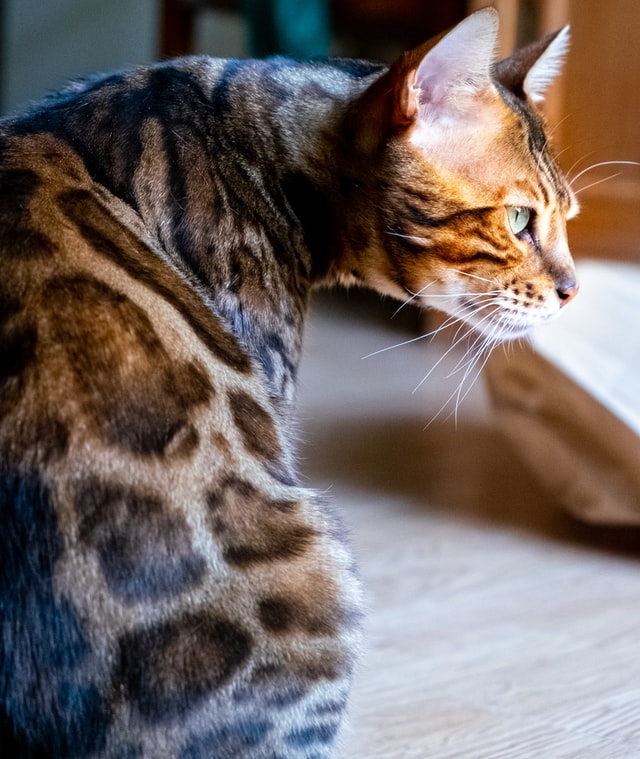
After all I was/am in a similar position to many of you- simply trying to learn and establish what’s best for me and any cat I may offer a home to.
For this piece, I contacted breeders found on the TICA website, plus the cattery from which we bought our kitten, to ask them for the number one piece of advice they would share with someone thinking of owning a Bengal cat.
Well that was the intention, but after reading what they’d sent me, I decided to share pretty much the lot.
These people are experts with varying degrees of experience.
However, it’s always worth researching for yourself as much as possible about the subject as breeders can and do differ in terms of their opinions.
Nonetheless, this article brings together valuable knowledge and insight.
Some comments have been edited for brevity but most are in their original format.
So, in no particular order, let’s see what nuggets they had to share…
1. Buy From A Reputable Breeder
There is an increasing problem with so-called ‘Backyard Breeders’, that is, people breeding Bengals in poor conditions often without carrying out the required health checks.
Unsurprisingly then, buying from a reputable breeder featured quiet highly in terms of advice.
Dawn Schwiebert, from Exotic Bengals of San Diego, not only breeds Bengals, but also runs a rescue owing to the number of poorly raised cats that have since come into her care from people that bought from unethical breeders.
She says:
“The most important thing a buyer should know before buying a Bengal is that they’re working with a reputable Bengal breeder. I get heart breaking calls from potential clients regularly that have either been scammed from someone who doesn’t actually have Bengals at all or have acquired a Bengal through a backyard breeder and have, since, gone through an incredible amount of heart break and vet bills.”

To ensure a breeder is reputable, Dawn suggests the following:
“First and best, find a breeder on the TICA website (TICA: The International Cat Association). Yelp is also a decent tool, though honestly a good scammer can get a big group of friends to give them rave reviews. The other option is by referral by someone who has gotten a healthy and well socialized Bengal through a breeder in the past.”
Nicole Conley, from Descanso Ranch Cattery in California advised on a breadth of subjects, including buying responsibly to ensure you get a healthy, well-rounded, kitten.
“You can argue that the health of the kitten is the most important, but if you’re buying from a reputable and honest breeder, you’re very unlikely to encounter health issues.”
“Finding the right breeder and meeting the breeder in person is critical. Or at least video chat. You can see first hand, the environment, health, diet, and the personalities of the cats. Also ask the breeder if they are genetically testing for PK-Deficiency and PRA-B? Do they scan or not scan for HCM and why? Does the value of the breeders align with yours?”
For more on this, see Bengal Cat Scams: List of the Top 9 Things To Know to Avoid One
2. Understand And Prepare For A Bengal’s Personality And Behaviour
Several breeders stated this as their #1 piece of advice.
There are common traits that feature in the Bengal breed, that are perhaps rarer in other domesticated cats and many of the breeders I contacted where keen to emphasise this, including Basia Lee, from Hotfuzz Bengals, in Gloucestershire, England from whom we got our kitten Hazel.
She warned against being guided purely by looks and suggests visiting another owner to get an authentic account of what it’s like to own a Bengal:
“I think a lot of people buy them because they like the look and idea of them but then don’t fully understand that they can be high maintenance and a very high energy breed and get bored easily if they don’t have enough mental stimulation. So then people complain when they start acting out etc. So I think it is important to properly research the breed and character traits. And if possible, get experience by visiting another owner.”
Diane from Valleykatz Bengals in Sarasota, Florida mentioned the similarity Bengals can have to dogs:
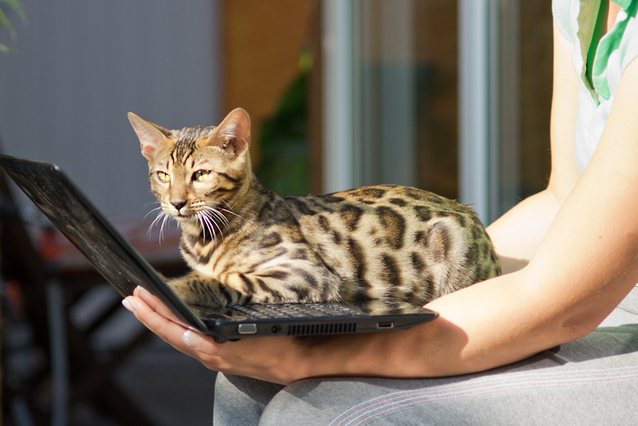
“I tell people Bengals are highly intelligent, athletic and more dog like- they’ll meet you at the door, come when called, and need to be in the middle of everything going on in the house.”
“They are on the desk when you are on the computer, on the couch when you’re watching a movie (but not necessarily on your lap) and take over that spot on the bed next to you.”
“Definitely not couch potatoes.” (See 6 Reasons Why A Bengal Cat and Dog Can Get Along)
Cassandra Apodaca who runs Colorado Bengals, in Brighton, Colorado, provided advice on a breadth of personality and behaviour related matters:
“Bengals are more like a shadow than a lap cat, they like to go wherever their owners are, and they are very “helpful” with household chores wanting to be included in everything their owners do.” (Author’s note: I’ve found my Bengal’s not a fan of the vacuum cleaner however… I say not a fan… she hates it…)
“Many Bengals like water, with some even known to shower or bathe with their owners and almost all Bengals prefer to drink from a slow dripping tap or fountain over a water bowl.”
“They are very vocal (males more than females) and will meow incessantly if they want something or are left alone. If a quiet household is something cherished, a Bengal may not be the right choice of companion.”
The need for attention and stimulation was again highlighted by Cassandra,
“Bengals are very intelligent and need stimulation, they will not be content to lay around all the time, and if left to their own devices may become mischevious. Playing fetch, walking on a lead, and running on a cat wheel are some great ways to let a Bengal get their energy out.” (For more on this, see The Best Bengal Cat Harness 2021)
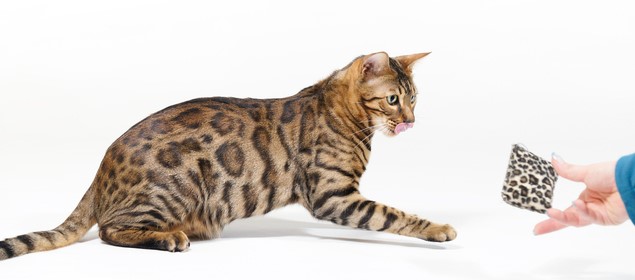
Appropriate play at a young age is also vital to instil correct behaviours and to avoid being scratched or bitten:
“It is important never to play rough with your bare hands with a Bengal or any pet. It is only appropriate to play with toys (springs are a favorite), feather-wand or balls. They have sharp claws and teeth and as with any pet if trained young to play appropriately will be great household companions.” (For toy ideas, see Best Toys For Bengal Cats (in the world) 2021)
The #1 piece of advice from Patricia Killmaier founder of Aluren, in West Palm Beach, Florida, was also related to behaviour:
“Basically, just be prepared for a cat that is smarter than you.”
She added:
“They are quite endearing, very affectionate and just a joy to live with. I’ve had Bengals for over 30 years and they still fascinate me.”
Kristi Hildebrand who runs Mid-Atlantic Bengals, in Maryland reinforced some of the the advice provided by others with regards to the time commitment Bengals need.
Additionally, potential owners must be wary when mixing Bengals with other non-Bengal breeds:

“Understand the time commitment to them. They love to be loved! So, with that being said, they need you! They want attention! They need attention! GIVE THEM affection!!”
“Depending on the “F” generation, do not assume they are safe with regular domestic house cats!!” (Author’s Note: The “F” generation refers to how close a Bengal is to the original cross between a domestic cat and the Asian Leopard Cat).
Finally in this section, advice from Sharon Huskey, owner of A Home For Maya Cattery in California.
Her advice was from a slightly different behavioural angle, although again she reiterated how vital it is to handle Bengal kittens appropriately when young:
“The people that I have talked to (who are interested in Bengals) assume that they are really wild cats, but they are not. My kittens are just like any other kittens. They play and run all over but also like to cuddle. The only reason a kitten would ever show aggression would be the way their owners were playing with them, fingers and hands vs. a toy.”
3. Know What It Is You Want In A Cat And Whether A Bengal Fits Your Lifestyle
It’s perhaps easy to focus on the price of a pet and be seduced by a ‘cute’ kitten.
But the many of the Bengal breeders who helped with this article want buyers to take an in-depth look at their lifestyle, to see how a cat like a Bengal will fit with it and what they hope to get out of the relationship.
Nicole from Descanso Ranch Cattery suggests potential owners ask themselves the following, and for good reason:
“Are you someone who works a lot and isn’t home often? Are you looking for a companion to snuggle with and sit on your lap when you are around? Or are you looking to create a more intimate bond, spending time throughout the day and going on walks and adventures together?”
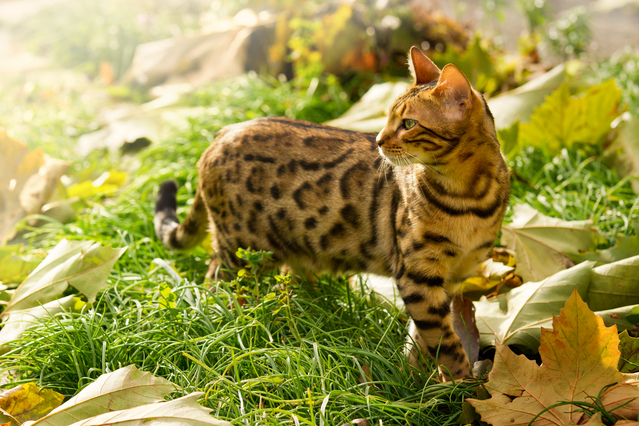
“Choosing a Bengal that doesn’t fit you, can lead to problems down the road. Although it’s nearly impossible to judge a cats future personality when they’re a kitten, you can look at the parents to get indicators of how they’re going to be. But a lot of the personality depends on you and the time you invest in them.”
As has been mentioned, understanding a Bengal’s needs and subsequently how you deal with them is vital:
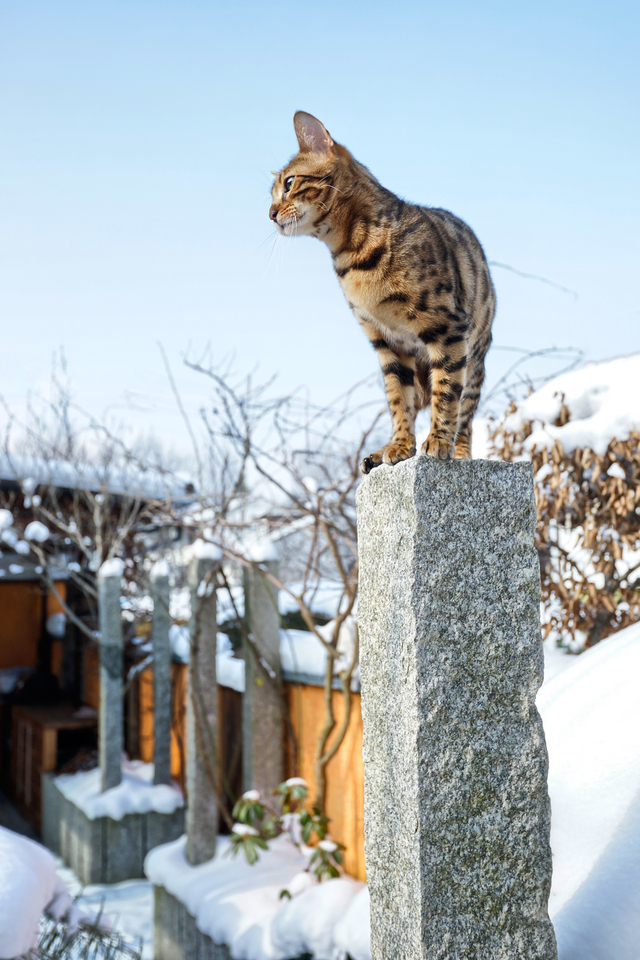
“You need to be sure you’re ready for them. Bengals enjoy spending time with you and doing adventurous activities. Being able to share these activities with your cat will make your bond strong. Having the ability to understand what your Bengal is communicating to you about their needs, is really important. Bengals have a lot of energy, especially when they are young, and you want them to exert that energy in a positive way.”
Finally, Nicole expressed sentiments other breeders touched on in that your cat will ultimately be a reflection of your personality and how you’ve raised it:
“Whether it’s harness training, feather chasing, interactive toys, bathtubs with mechanical fish, or running on an exercise wheel at 4am. You want to make sure you are prepared for that. Because the personality of your cat will have a lot to do with you. You need to expose them to things you want to do with them from a young age.”
4. Establish How And What You Will Feed A Bengal
This is not as easy as it sounds.
There is some debate as to what constitutes the ‘best’ diet for a Bengal.
And what you feed your cat may also depend on your personal preference.
Cheryl Michael from The Regal Bengal in Fishers, Indiana stated a raw meat diet as being the most important factor to consider:
“The most important thing for me has been feeding them raw meat as soon after birth as possible. I feed them chicken the most. Mine don’t like beef. Tuna is ok, duck, no pork or pork by-products. If you don’t do this their tummies are more susceptible to diarrhea and vomiting.”
(Author’s note: The realm of diet is somewhat controversial. Many promote a natural, raw meat diet for Bengals and cats in general. However, one must be wary when doing this, as an unbalanced, incomplete raw diet can lead to health problems. There is also an added risk to humans when handling raw meat. Again, this is something you can ask your breeder about).
Nicole from Descanso Ranch Cattery also wanted to advise on diet:
“Are you looking to be able to free feed your cat or do you have the time to set up food at certain times each and every day? Bengals benefit from eating a high quality food with high protein and lots of water content. Reading ingredients on food labels and understanding what they mean is something you would want to do. The first ingredient should be high quality meat such as chicken, beef, fish, and not by-product like chicken meal for example. So it’s important to find out what the breeder is feeding.”
5. Your Bengal Will Be Safer Indoors
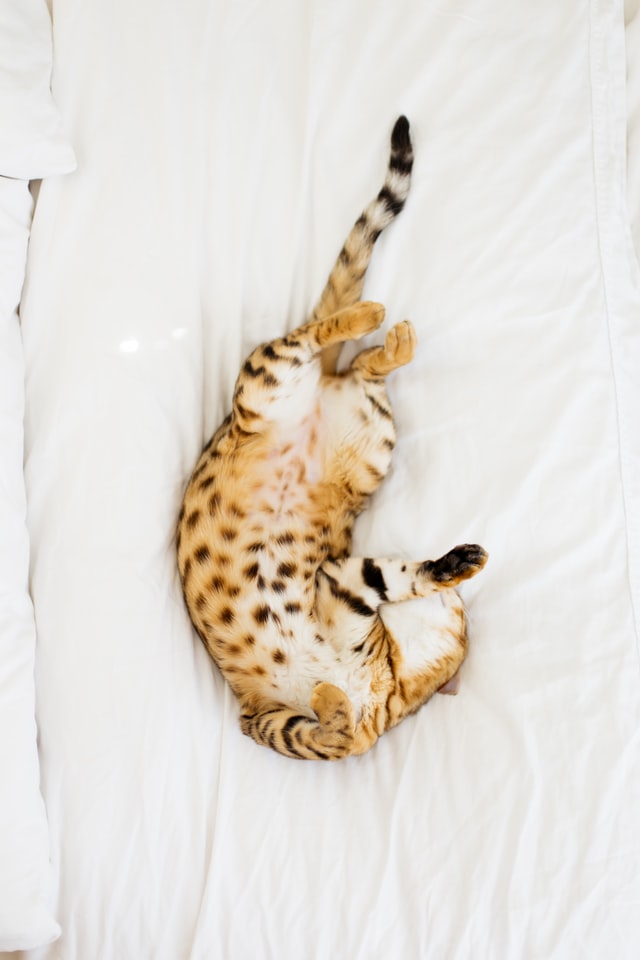
Indeed, this is true of all cats.
Housecats live a longer and healthier life than those that go outdoors due to a decreased risk of being hit by a car, acquiring a disease or being injured by other animals. (See How Long Do Bengal Cats Live? 12 Excellent Ways To Boost Life Expectancy).
Bengals in particular are also at higher risk of being stolen owing to their value.
If you still intend to let your cat out, Sharon Huskey warns of the dangers of doing so unsupervised:
“Bengals are still are not safe to be unsupervised outdoors and can be stolen or attacked by a coyote just like any other cat.” (Or a fox if you live in the UK or Europe).
Cassandra Apodaca from Colorado Bengals advised on how to keep your Bengal safe, outside:
“Bengals are tall athletic cats and can jump to great heights. Many owners find that an 8ft fence in the garden cannot contain their Bengal and others find them balancing atop their bedroom doors. A catio is a great way to allow for outside time and soaking of the sunshine.”
6. Choose A Cat You Are Completely Happy With
This might seem obvious, but there is plenty to consider- health, temperament, gender, colour, pattern- in fact, all aspects of the cat’s appearance.
Nicole from Descanso Ranch Cattery (yes she was very thorough) summed up this point:
“Finding a Bengal that you think is beautiful and one that you’re proud of is a big consideration. Look at the parents and last litters to give you a better idea of what your kitten will look like as they mature.”
The first kitten we went to visit we rejected based on its colouring, even though all other aspects were fine (see blog post Stormborn Bengals).
There is no harm in being picky when it comes to a long term commitment such as this.
7. Other points to consider and be aware of- Worming and Ketamine
If purchasing a Bengal that is to be shipped/flown, Cheryl from The Regal Bengal advised the following:
“Also make sure you have them dewormed immediately if they are flown in cargo. They can pick them (worms) up from the people that handle other animals. I didn’t do that and they had horrible vomiting and diarrhea.”
And Kristi from Mid-Atlantic Bengals brought up a something many not even have thought about:
“Be wise. Always investigate before you assume you just know the answer, for example…. Your veterinarian may not know that KETAMINE is a KILLER for a BENGAL CAT!! THE Bengal cat cannot metabolise Ketamine and it will give the Bengal cardiac arrest!! So, please save the heart ache and mention it right away as an alert on your Bengal cats chart!!!”

(Author’s Note: This is a potential issue I was completely unaware of but was relevant due to having our Bengal Hazel neutered. Ketamine is a drug used as an anaesthetic or sometimes an analgesia (to relieve pain) in surgery usually in combination with others. Having since researched a little on the subject it seems theres is reason for some concern -see this article on Ketamine and Cats, this Bengal Health Info sheet and this page that lists Common Medical Issues for Bengal Cats. There will be no harm in checking with your breeder as to whether their Bengals have ever had problems. And if still concerned, contact your vet (which we did) to find out what drugs they use and if they have an alternative to ketamine is available).
Summary
Clearly, there is much one needs to know before acquiring a Bengal as a pet.
Avoiding so-called ‘backyard breeders’ is high on the list of priorities as this has further implications for the health and behaviour of kittens raised in poor conditions.
Understanding personality traits of the cat/breed is also something many breeders here were keen to emphasise. You must question whether you are prepared for and have the resources (both mentally and practically) to look after an intelligent, inquisitive, sometimes demanding pet.
Advice regarding diet will make you question whether you should or are happy to feed your pet raw meat.
It’s important to reflect on whether your lifestyle, routine and expectations fit with owning an animal of this nature- one that is probably best kept indoors.
And you must be entirely happy with all aspects of any kitten or cat you intend to home.
Of course a good breeder can and will help with many of these, but ultimately, the responsibility lies with you.
My thanks to the following breeders for their assistance with this article:
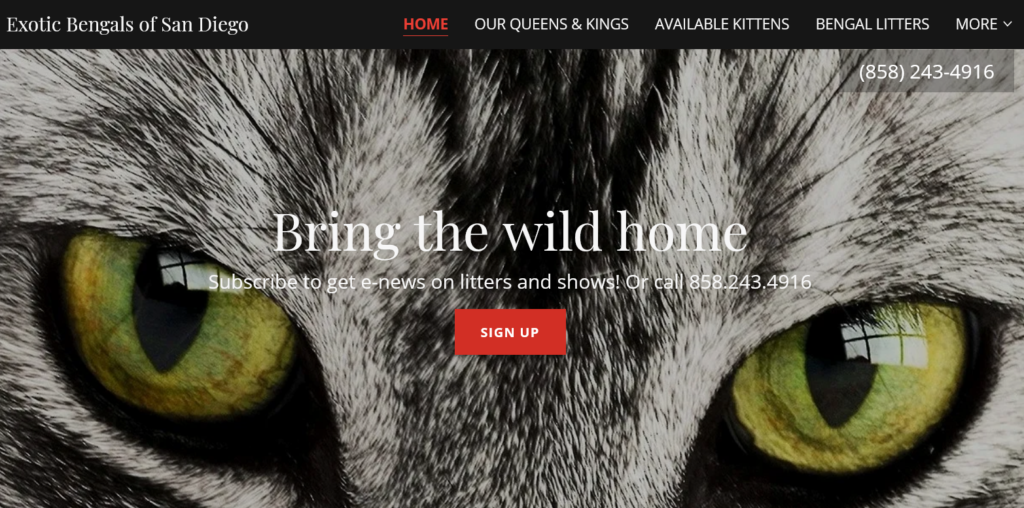
Exotic Bengals of San Diego
Exotic Bengals of San Diego is a small, boutique cattery in California. It is run by Dawn Schwiebert.

Hotfuzz Bengals
Hotfuzz Bengals is run by Basia Lee, a small hobby breeder in Gloucestershire, England.

Valleykatz Bengals
Valleykatz Bengals is a small, family owned breeder in Sarasota, Florida, specialising in the breeding of Silver Bengals.
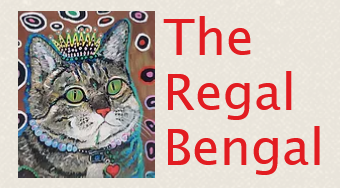
The Regal Bengal
The Regal Bengal is a family orientated cattery based in Fishers, Indiana.

Colorado Bengals
Colorado Bengals is based in Brighton, Colorado.

A Home For Maya Cattery
A Home For Maya Cattery is based in California.

Aluren
Aluren in West Palm Beach, Florida, is a cattery with over 25 years of Bengal breeding experience.
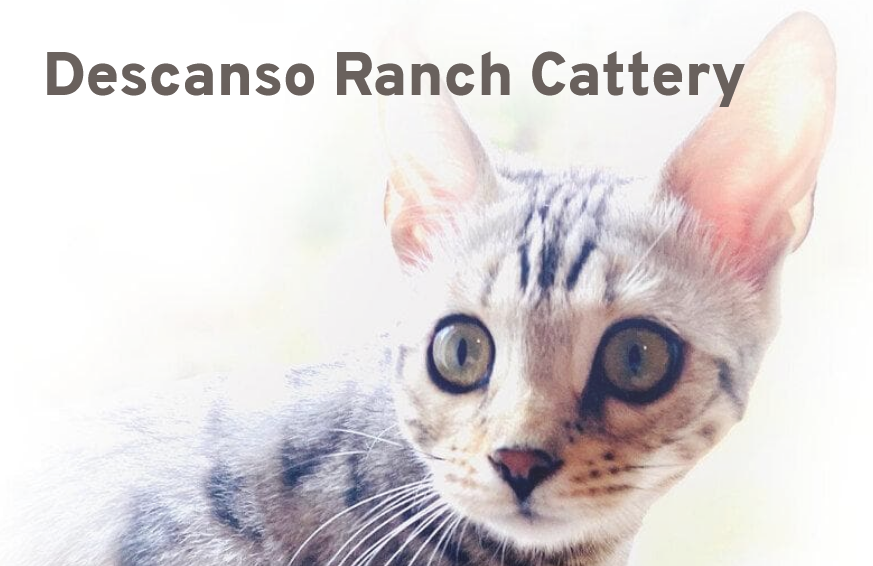
Descanso Ranch Cattery
Descanso Ranch Cattery is a homed-based cattery in Descanso, California.

Mid Atlantic Bengals
Mid Atlantic Bengals is a small in-home Exotic Leopard Bengal Cattery in Maryland.
